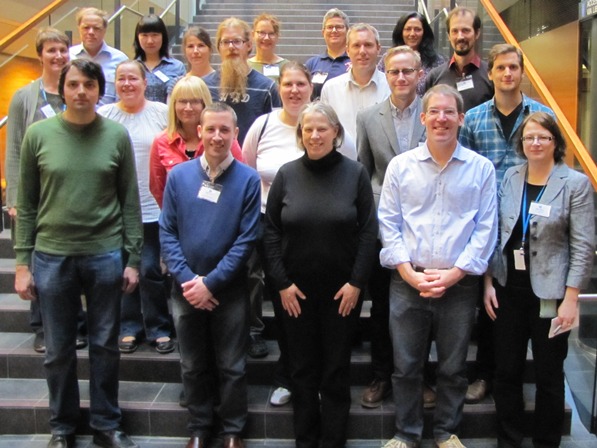Helena Laaksonen
CESSDA Expert Seminar in Tampere

Participants of the CESSDA Expert Seminar 2012
The annual expert seminar of the Council of European Social Science Data Archives (CESSDA) was held in Tampere, Finland, in October 2012. CESSDA experts discussed data acquisition processes and the terms of data deposition agreements. The idea was to share experiences and learn from others. Judging from the presentations, research funders increasingly have data policies supporting open access to data. This has had a positive effect on the acquisition of data archives.
If research funders or legislation require that collected data should be openly accessible within a stipulated period of time, data acquisition is much easier than in those countries where no such requirements exist. In the UK, the Economic and Social Research Council (ESRC) withholds the final payment of a grant if data have not been offered for archiving within three months of the end of the grant period. In Denmark and Norway major funders require that data collected during the funding period be deposited at the national data archive.
Situation in Finland and Sweden
Even in Finland and Sweden, funder policies are changing. The Academy of Finland started to require that grant applications include a data management plan in 2008. Since then, an increasing number of projects have decided to deposit their data at FSD, even though archiving is voluntary. This trend will probably strengthen when ongoing research projects are completed.
The main research funder in Sweden, the Swedish Research Council, begun in 2012 to require that applications contain a data publication plan. This induced about 100 researchers to contact the Swedish National Data Service (SND) during the application period, even from fields outside of the SND scope which is humanities, medicine and social sciences. In the future, the Council will inform the archive of applications where the SND has been mentioned as the data depository.
So it seems that data policies adopted by research funders make a difference, even when they are recommendations rather than obligations. On the other hand, even if it is obligatory to deposit data at an archive, researchers do not always offer their data before archive staff contact them.
Research data for journalists
Another factor influencing the willingness of researchers to deposit their data is the terms of deposition agreements. This issue was brought up in several presentations. In addition to obligations, discussion highlighted the importance of making data archiving useful to researchers. Data archivists think that providing open access to data should be as important an academic merit as writing a scientific article. Furthermore, it has already been shown that publicly available data increase the citation rate of a publication.
Researcher Tuula Juvonen surprised the audience by recommending an even more open access policy than customary. She urged people to question the practice of research data being accessible only for scientific and educational purposes. Juvonen herself has asked her research participants to consent to a wide range of reuse purposes, including media documentaries and art.
The presentations held at the expert seminar are available at the seminar website.